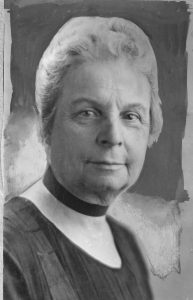
Photo info …
Credit: Indiana Historical Society, Subject Collection Hi-HyView Source
(Apr. 7, 1858-Aug. 16, 1933). Hoagland, a native of Fort Wayne and a prominent club woman, viewed the library as an agent for social change. After attending a summer course at Melville Dewey’s New York State Library School in 1898, she worked as an itinerant library organizer and in 1901 became state organizer of libraries for the recently established Public Library Commission of Indiana. Hoagland’s agenda was very similar to that of her counterparts in other states: to circulate traveling libraries, organize public libraries, and instruct librarians. Field visits convinced her of the need for the systematic training of Indiana librarians.
In 1905, Hoagland opened a library school in Indianapolis at the Winona Technical Institute, a privately funded manual training school sponsored by the Presbyterian-based Winona Assembly and Summer Schools, which later became .
As her involvement with the library school deepened, she severed her connections with the Public Library Commission. When the institute experienced financial difficulties in 1908, Hoagland moved the library school to the Indianapolis and incorporated it as a private venture.
Hoagland appealed to club women, influential friends, and Andrew Carnegie for contributions to maintain the Indiana Library School until state support could be secured. She also appointed an executive board consisting of such prominent Hoosiers as author , historian , and Butler College () president .
Although Hoagland persuaded friends in the legislature to introduce a number of bills on behalf of the school, the state’s librarians did not support her efforts. Her advocacy of social reform and the aggressive tactics she employed to promote the passage of library school legislation alienated many Hoosier librarians and made her school an irritant. Opponents cited the small number of library positions available each year, low salaries, and the presence of recognized library schools in neighboring states as reasons why such a school was unnecessary. The school closed in 1912 when Hoagland finally withdrew her energy, time, and financial backing. Of the 11 library schools in existence at this time, hers was the only one to fail.
Hoagland died in 1933 after spending the last years of her life engaged in personnel work at the . Although she fully expected her school to reopen, the state was without a year-long library school until 1938 when one was established at Indiana University.

Help improve this entry
Contribute information, offer corrections, suggest images.
You can also recommend new entries related to this topic.

